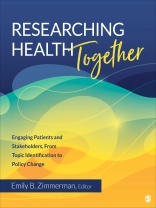The challenges of addressing health disparities, the ethical imperative to include stakeholders in research, and the slow translation of research evidence into practice are all driving a movement towards more community-based and participatory approaches to research. Researching Health Together brings together authors who have produced innovative methods or implemented projects focused on different stages of the research process, from question development to evaluation and translation. Editor Emily B. Zimmerman gathers exemplary new methods and projects into one place for the benefit of students designing research projects and proposals, those learning stakeholder-engaged methods, and those involved in implementing and funding stakeholder-engaged projects. Each chapter addresses: how engagement was conceptualized, organized, and implemented; how engagement was evaluated; impacts on processes and outcomes of the project; and facilitators, barriers, and lessons learned. The book serves as a core textbook for courses in community-based health research at the graduate level.
‘[This book] focuses only on translational health research and expands beyond CBPR to include practice-based research networks (PBRN) and stakeholder-engaged research within health systems…. The overall strengths of this book are its in-depth and almost inspirational focus on CBPR methodology, be those actual geographic or cultural communities or disease-based communities…. Researching Health Together, in its first edition, is a necessary bridge from the theory of participatory health research to its application across research environments.’ – Journal of Participatory Research Methods
Table of Content
Foreword – Joe V. Selby
Acknowledgments
About the Editor
Introduction – Emily B. Zimmerman, Thomas W. Concannon
Part I: Stakeholder Engagement in Research Topic Identification and Modeling
1. Grassroots to Grasstops: A Stepwise Approach to Identify Community Health Priorities – Ann M. Cheney, Christina M. Reaves, Mary Figueroa, Alejandra Cabral, Greer Sullivan
2. Deliberative Engagement of Communities in Decisions about Research Spending (DECIDERS) – Susan Dorr Goold, Zachary E. Rowe, Karen Calhoun
3. Group Model Building as a Community Engagement Strategy – Faustine Williams, Peter S. Hovmand, Kurt C. Stange
4. The SEED Method: A Multi-level Stakeholder Approach to Research Question Development and Prioritization – Emily B. Zimmerman, Sarah K. Cook
Part II: Stakeholder Engagement in Research Design
5. The Community Engagement Studio: Tapping Into the Lived Experience of Community Members to Enhance Research – Yvonne A. Joosten, Tiffany Israel, Leah Dunkel, Jacqueline Sims, Consuelo Hopkins Wilkins
6. The History of PCORnet – Kimberly Marschhauser, Claudia Grossmann, Maryan Zirkle
7. Partners, Not Participants: Engaging Patients in the American BRCA Outcomes and Utilization of Testing (ABOUT) Network – Marleah Dean, Sue J. Friedman, Rebecca Sutphen, Beth Ann Bourquardez Clark, Debra Duquette, Lisa F. Rezende
8. Engagement Methods for Practice-Based Research Networks and the Challenges with Health Information Technology Implementation – Alex Krist, Paulette Lail Kashiri, J. Eric Peele, Gary Iwamoto, Colin Banas, Jon Puro
Part III: Implementing Stakeholder-Engaged Research
9. Free Range Humans: Engaging Patients, Practices, Provides, and People on the High Plains – John M. Westfall, Linda Zittleman, Maret Felzien, High Plains Research Network (HPRN) Community Advisory Council
10. Engaging Stakeholders in Implementation of Evidence-Based Programs – Annette Boaz, Allison Metz
11. Communities Engaged and Advocating for Smoke-Free Environments (CEASE) – Payam Sheikhattari, Jummai Apata, Laurie Bezold, Lisa Bleich, Fernando A. Wagner
12. Translating Evidence to Policy: A Case Study of the San Francisco Soda Tax – Roberto Vargas, Casey N. Palmer, James Rouse Iñiguez, Paula Fleisher, Christina Goette, Brittni Chicuata, Sarah Campbell Fine, Eric Mar, Vanessa Bohm, Laura A. Schmidt
Part IV: Stakeholder Engagement in Health and Health Systems Interventions
13. Comparative Effectiveness Research: Stakeholder Engagement for a Comprehensive Perspective – Kelly Williams, Tracy Carney, Jane Kogan, James Schuster
14. Achieving Patient Centered Health Care Innovation Through Stakeholder Engagement – L. Ebony Boulware, Patti L. Ephraim, Teri Browne, Tara Strigo, Felicia Hill-Briggs, Jamie Green, Chelsie Hauer
15. Community Engagement in an Urban AIAN Community to Address Diabetes Prevention – Lisa G. Rosas, Jan J. Vasquez, Jill Evans, Rhonda Mc Clinton-Brown, Alberto Ojeda, Matilda Owaleon-Ojeda, Wayne Scott Waters, Robert E. Garcia
16. Boot Camp Translation – Linda Zittleman, Ashley Espinoza, John M. Westfall
Part V: Governance, Evaluation, And Ethics In Stakeholder-Engaged Research
17. Building the Proper Foundation: Governance for Stakeholder-Engaged Research – Holly L. Peay, Elizabeth L. Cope, Elizabeth Horn, Madelaine E. Faulkner, Thomas W. Carton, Megan O’Boyle, Lorraine B. Johnson
18. Evaluating Engagement: Does the involvement of stakeholders improve research? – Thomas W. Concannon
19. Collaborating to Evaluate: The Sí Texas Partnership-Centered Evaluation Model – Michelle K. Brodesky, Karen Errichetti, M. Marlen Ramirez, San Juana Martinez-Gomez, Stephanie Tapia, Lisa Wolff, Mary V. Davis
20. Ethics Considerations When Involving Patients as Partners in Health Research – Donald J. Willison, Michael Mc Donald
Acronyms
Glossary
Index
About the Contributors
About the author
Emily Zimmerman is an associate professor at the Virginia Commonwealth University Department of Family Medicine and Population Health, Division of Epidemiology. She is a senior researcher at the VCU Center on Society and Health, where she is director of community engaged research and qualitative research. She received her M.P.H. from the University of South Carolina, Arnold School of Public Health; Ph.D. in sociology at the City University of New York Graduate Center; and M.S. in social research from Hunter College. Her work focuses on social determinants of health, placed-based determinants of health, and community and stakeholder engagement. She developed the SEED Method for Stakeholder Engagement in Question Development and Prioritization, a multi-stakeholder methodology for involving stakeholders in research development. She also helped to found the Engaging Richmond community-university partnership at VCU in 2011 to identify and address the health priorities of residents in Richmond′s East End. Currently, she is partnering with investigators at Virginia Tech, with funding from the Corporation for National and Community Service, to use the SEED Method to develop community action plans to address the opioid crisis in a rural Virginia community.












